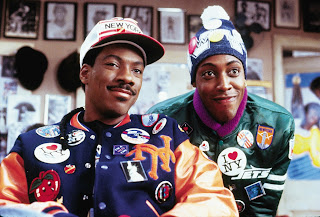COMING TO AMERICA
Long before Wakanda was the great and uber-wealthy African nation ruled by a powerful, benevolent absolute male monarch, there was Zamunda. Coming to America is a delightful romantic comedy with a dynamic Eddie Murphy performance (or rather, series of performances) that has not lost its power to entertain and delight.
Zamundan Prince Akeem (Murphy) is pampered by his parents, King Joffery (James Earl Jones) and Queen Aoleon (Madge Sinclair). He, however, does not want to be pampered but to be his own man. Moreover, he does not want to have an arranged marriage, wanting a woman who will love him for himself and not his royal status. King Joffery, believing Akeem's delay is a desire to "sow his royal oats", allows Akeem and his best friend Semmi (Arsenio Hall) 40 days of freedom. Akeem decides to search for his future wife in America. Where to find a woman to rule beside him?
Queens, New York City of course.
With that, Akeem and Semmi go to NYC, where they masquerade as simple African students, Akeem delights in doing menial labor, much to Semmi's horror and disgust. They eventually find jobs at McDowell's, a small fast-food restaurant that bears much more than a striking similarity to McDonald's. Cleo McDowell (John Amos) likes his African boys, and Akeem finds himself enchanted by Cleo's daughter Lisa (Shari Headley). Like Akeem, Lisa is being pushed into marrying someone she clearly does not love, hair-product heir Darryl Jenks (Eriq LaSalle). Will Akeem be able to win his fair maiden over? Will the Zamundan Court discover what he's up to and put a kibosh on the whole matter?
Coming to America is hilarious thanks to the situations that the characters find themselves in. Right from the start the melding of grand statements to oddball situations as well as how some situations are played out. As King Joffery attempts to dissuade his son from going against tradition to marry someone of his own choosing, the king remarks how nervous he was when meeting his intended. "There is a very fine line between love and nausea," Joffery remarks in Jones' stentorian tone.
The fact that he speaks this bizarre line with his distinct voice and with a straight face makes it all the funnier. Here is one of the film's successes: no matter how silly things are, everyone plays it straight.
At the heart of Coming to America's success is the sweetness the film has. Akeem is an innocent in many ways, unaware of how odd his actions and behavior come across to others. After two Zamundans recognize him and pay homage with one of them particularly worshipful, Lisa asks who he was. "Just a man I met in the restroom," is his reply. He clearly does not get that this statement could have different interpretations, and that makes it all the funnier.
The performances are all top-notch, everyone playing things straight but with just enough humor to make the film fun as well as funny. Coming to America is one of Eddie Murphy's best roles, or rather multiple roles. He not only plays Prince Akeem, but also Randy Watson, the highly untalented lead singer of the band Sexual Chocolate and two men at the nearby barbershop: the owner Clarence and most surprisingly, Saul, the longtime Jewish customer. To flip seamlessly from one to another is a credit to Murphy's skills.
As a side note, Rick Baker's makeup work is masterful. Granted, you could tell that either Murphy or Hall were the characters, but Baker did such great work that Murphy could possibly pass as an old Jewish man.
Hall also donned makeup as the loutish preacher Reverend Brown, another barbershop employee Morris, and as a particularly unattractive and aggressive potential date. His performance is also pretty good, not as naive as Akeem but also not able to do anything to stop the prince. They made for a good double act, making the on-screen friendship sincere.
Headley is beautiful as Lisa, though at times a bit weak. Amos' Cleo, forever stubbornly insisting McDowell's and McDonald's were quite different only to see that they were not, was hilarious. Having him call Akeem "Kunta" is a nice in-joke. It probably is not as appreciated as the Trading Places in-joke where Don Ameche and Ralph Bellamy recreate their Duke Brothers bit for a funny cameo, but there it is.
LaSalle showed a different side in his arrogant and bigoted Darryl, showing he can play comedy even if it is as broad as the others.
It is interesting that save for Louie Anderson as a McDowell's employee, the entire cast was African American (Anderson being the token white guy). It proves that Americans of all backgrounds can enjoy a predominantly black film if the material is there. Coming to America does not trade on stereotypes, though the sleazy preacher and loquacious barbershop denizens do dive into the African American experience.
Coming to America does such a good job in how it shows its characters. It has overall positive portrayals of almost all the characters. Barry W. Blaustein and David Sheffield, working from Murphy's story idea, set up situations for our characters, which allows the characters in turn to act or react in straightforward ways even in the silliest of situations.
Coming to America is a sweet and more important funny romantic comedy. It is perhaps a bit long with occasional tangents (I don't think we need so much Sexual Chocolate or barbershop ramblings). On the whole though, I think people will like this fish-out-of-water film where love and laughter are greater than all the gold in Zamunda.



No comments:
Post a Comment
Views are always welcome, but I would ask that no vulgarity be used. Any posts that contain foul language or are bigoted in any way will not be posted.
Thank you.